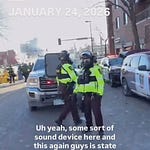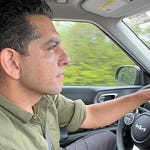By Nick Valencia | September 29, 2025
THE STREETS OF AMERICA— It is often said that police are here to serve and protect. But in the wake of Donald Trump’s mass deportation policy, for entire swaths of the country that premise is collapsing. The ICE sweeps have left immigrant neighborhoods skeptical of law enforcement, and in many cases unwilling to trust them at all.
In that vacuum, from the streets themselves, new forms of civil defense are emerging.
From West Valley City, Utah, to Huntington Park, California, to the swampy edges of the Florida Everglades, ordinary citizens are creating their own defense brigades, patrols, and surveillance systems.
None of these groups are linked. They sprang up, organically because the people inside them felt they had no other choice.
Utah: Watching the Watchers
When I met Chīmalli in Utah, he spoke like someone who understood both the stakes and the odds.
A member of the Brown Berets, he framed the government’s strategy bluntly.
“The Donald Trump administration wants all police departments to work together to eradicate undocumented people,” he told me sitting on a park bench. He asked us not to show his face or identify him by his full name for fear of retribution by law enforcment.
Chīmalli had spent the morning fielding a 6 a.m. call about what looked like a SWAT raid.
“I got pictures,” he told me. “Somebody’s calling me and they’re nervous, and I gotta verify, is this an actual ICE raid?”
His phone is constantly buzzing with alerts, questions, rumors. Sometimes he drives to the scene himself. Sometimes he films, letting agents know they’re being documented.
For him, the point isn’t only awareness. It’s action.
“Because it’s more than just knowing your rights,” he said, “but it’s applying your rights.”
In a state where the line between tactical police operations and federal immigration raids has blurred beyond recognition, the work of verification has become its own form of defense. Often times these videos are the only documentation of these detentions and the only way family members to verify the identity of missing loved ones.
California: Patrols and Resistance
On the streets of Huntington Park, California, “Chavo” of Unión del Barrio speaks with the cadence of urgency. We are choosing not to disclose his full name to protect him from doxing.
“Patrols. Look for them. Alert community,” he told me one day standing on a corner of his hometown. “Get ready. Self-defense. We got to be ready. They’re coming right for us.”
His bluntness is delivered in bursts. He told me the “turning point” came during what activists now call the Paramount-Compton battle — a standoff between locals and police during those early days of the “ICE siege of LA.” The fight convinced locals they could resist.
“That shifted the spirit in the air of resistance,” Chavo said. “People are like, No, we’re holding this. I not only know my rights, I exercise them and I defend them. What’s left.”
Here on the streets of The Southland, civil defense looks less like documenting raids and more like neighborhood patrols, eyes on the street, bodies in place. The real-time updates on ICE locations are key to helping the community, especially with a platform boasting more than 140,000 followers on Instagram.
In this draconian era, which can sometimes feel like an episode of “Handmaid's Tale” it is both a warning system and a message: we are watching too.
Florida: Surveillance by Spreadsheet
More than 2,700 miles away, in the shadow of the detention site known as “Alligator Alcatraz,” the fight takes on another form. “Andy,” an activist who has been living out of her car near the facility, showed me her laptop.
On it: a public Google spreadsheet, meticulously tracking buses, staff, and vehicles.
“I have a spreadsheet that I’ve made on Google Docs that I’m giving the public access to that is just recording everything going in and out,” she explained.
Her hope is that data itself becomes a form of pressure.
“I hope that people call the businesses,” she said. “I feel like pressure could work on them. They know what they’re doing is wrong. And I hope that every time they drive by, they second-guess whether they should be in there, because someone is holding them accountable.”
If Utah’s model is verification, and California’s is patrols, Florida’s is exposure: using information itself as a weapon.
A New Kind of Protection
From Salt Lake City’s suburbs to LA’s working-class neighborhoods to a roadside encampment in the Everglades—the tactics differ, but the motivation is the same.
People feel abandoned — not just by their government, but by the institutions that once claimed to safeguard them. And so they are stepping up to protect one another.
These civil defense organizations aren’t militias, though they are well regulated as envisioned and protected by the constitution.
They are born of necessity, to protect freedoms. And in the absence of trust in police, they represent something bigger: an uncoordinated but unmistakable movement that insists on survival.











